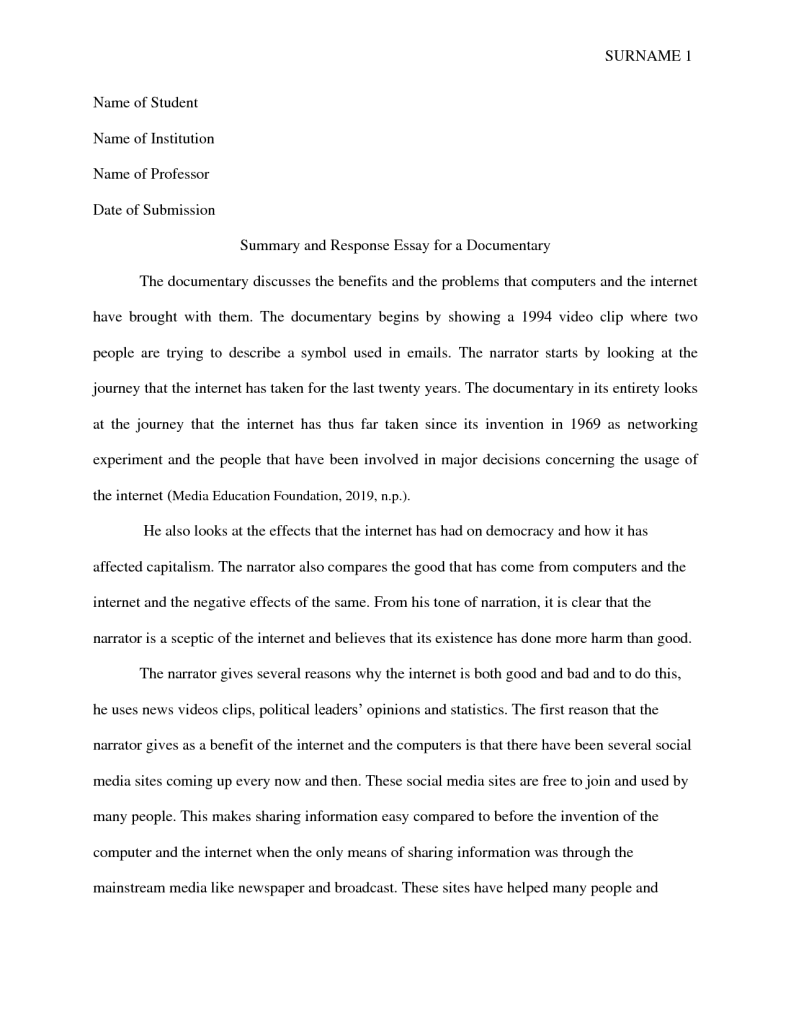A response essay, often a reaction or reflective essay, is a form of academic writing that allows you to express your thoughts, opinions, and insights in Response to a particular text, topic, or issue. It’s a genre that encourages the critical thinking and personal engagement structure of a Response Essay.

Table of Contents
A Response Essay Comprises the Following Elements
- Introduction:
- Begin with a captivating hook or an engaging anecdote to grab the reader’s attention.
- Provide essential background information about the text, topic, or issue you are responding to.
- Present a clear thesis statement that outlines your main argument or viewpoint.
- Body Paragraphs:
- Each paragraph should focus on a single point or idea related to your Response.
- Start each paragraph with a topic sentence that introduces the main point.
- Provide evidence or examples from the text or topic that support your viewpoint.
- Analyze and interpret the evidence to explain how it relates to your Response.
- Use transitions to ensure a smooth flow between paragraphs.
- Counterarguments (optional):
- Acknowledge opposing viewpoints or arguments.
- Refute these counterarguments with well-reasoned responses.
- Conclusion:
- Summarize the key points of your Response.
- Reiterate your thesis statement and the main arguments.
- End with a thought-provoking closing statement or a call to action.
Tips for Writing a Response Essay:
- Careful Reading: Begin by thoroughly reading and understanding the text or topic you’re responding to. Take notes and highlight key passages.
- Strong Thesis: Craft a clear and concise thesis statement that reflects your Response and provides direction for your essay.
- Evidence and Analysis: Support your points with specific evidence from the text or topic. Analyze how this evidence supports your viewpoint.
- Personal Reflection: Don’t shy away from sharing your thoughts and reactions. Your essay should reflect your unique perspective.
- Clarity and Conciseness: Write clearly, concisely, and organized. Avoid excessive jargon and complex language.
How to Write a Response Essay:
- Introduction:
- Introduce the text or topic you’re responding to.
- Present your thesis statement.
- Body:
- Develop your Response in well-structured paragraphs.
- Use evidence and examples to support your points.
- Conclusion:
- Summarize your Response.
- Restate your thesis.
- Offer a closing thought or reflection.
Response Essay Examples:
- Response to a Literary Work: Analyze and reflect on a novel or poem’s themes, characters, and symbolism.
- Response to a Film: Discuss your thoughts and feelings after watching a thought-provoking movie.
- Response to an Article: Critically evaluate an article’s arguments, evidence, and conclusions.
- Response to a Speech: React to a significant speech or address its impact on society.
- Personal Response Essay: Share your Response to a life-changing event or experience.
30 response essay topics
- The impact of technology on modern relationships.
- The role of education in shaping future generations.
- Exploring the themes of love and loss in literature.
- The influence of social media on mental health.
- The effects of climate change on global ecosystems.
- Analyzing the rhetoric of a political speech.
- The portrayal of gender roles in contemporary cinema.
- The significance of art in times of crisis.
- The ethics of genetic engineering.
- The importance of cultural diversity in society.
- The impact of technology on privacy in the digital age.
- A response to a significant scientific discovery or breakthrough.
- Analyzing the role of humor in literature and entertainment.
- The effects of social media on interpersonal relationships.
- A response to a famous historical speech or address.
- The portrayal of the environment in contemporary art.
- The ethical considerations of gene editing and CRISPR technology.
- The influence of culture on fashion and style.
- A personal reflection on the meaning of success.
- Responding to a controversial ethical dilemma in society.
- The impact of social media on political activism.
- A response to a historical event or period.
- The ethical dilemmas in artificial intelligence.
- The portrayal of mental health in contemporary literature.
- Analyzing the symbolism in a famous painting.
- The effects of globalization on local cultures.
- A personal reflection on the concept of happiness.
- The role of music in shaping cultural identity.
- The implications of online learning for traditional education.
- Responding to a philosophical treatise.
Pitfalls for Response Essays
While crafting a response essay, be cautious of the following pitfalls:
- Lack of Focus: Ensure your essay focuses on the text or topic you’re responding to without veering off into unrelated areas.
- Plagiarism: Always attribute ideas and quotes correctly, and avoid copying the text you are responding to.
- Emotional Response Only: While personal reactions are essential, remember to back them up with reasoned arguments and evidence.
- Poor Organization: Maintain a logical and organized structure with well-structured paragraphs and transitions.
- Neglecting Counterarguments: Address opposing viewpoints to strengthen your essay’s credibility.
In conclusion, response essays are a valuable means of engaging with texts and topics, allowing you to express your thoughts and opinions while honing critical thinking skills. With the provided structure, tips, examples, and issues, you are well-equipped to craft compelling response essays. Just remember to avoid the common pitfalls, and you’ll be on your way to producing thoughtful and engaging responses.
Types of Response Papers
Response papers come in various forms, each tailored to specific purposes and contexts. Some common types include:
- Personal Response: This type focuses on your feelings, thoughts, and reactions to a text, topic, or experience. It often includes anecdotes and reflections.
- Critical Response: In this type, you critically evaluate the text, article, or topic. You may analyze its strengths, weaknesses, and the effectiveness of its arguments.
- Formal Response: This type follows a structured format and may involve a more academic tone. It typically includes an introduction, body paragraphs, and a conclusion.
- Creative Response: This type allows for a more creative and imaginative approach. To respond to a text, you may use storytelling, poetry, or other creative elements.

Purpose of Crafting a Response Paper
The purpose of crafting a response paper varies depending on the type and context, but some common goals include:
- Engaging with the Material: A response paper allows you to actively engage with and reflect on a text, topic, or experience, leading to a deeper understanding.
- Expressing Personal Thoughts: It provides a platform to express your thoughts, opinions, and emotions regarding the subject matter.
- Critical Thinking: Writing a response paper encourages critical thinking and analysis as you assess the merits and shortcomings of the content.
- Communication Skills: Crafting a well-structured response paper hones your communication skills, helping you convey your ideas effectively.
- Academic Assessment: In an academic context, response papers may be assigned to assess your comprehension of course materials, critical thinking abilities, and writing skills.
- Artistic Expression: Creative response papers allow for artistic expression, enabling you to respond to a text or topic uniquely and imaginatively.
FREQUENTLY ASKED QUESTIONS
1.What is a Response Essay?
A response essay is an academic or personal essay where the writer provides their reaction, thoughts, and analysis in response to a particular text, article, book, film, or other media. It involves articulating one’s perspective, opinions, and content evaluation.
2. What are the elements of a Response Essay?
A response essay typically includes a summary or brief description of the source material, the writer’s reaction or response to it, supporting evidence or examples from the source, and a critical analysis that examines the strengths and weaknesses of the source.
3. How do I choose a Topic for a Response Essay?
To select a topic for a response essay, consider a text or media piece that interests you or relates to your academic or personal interests. It could be a recent news article, a book you’ve read, a film you’ve watched, or a research paper in your field. Choose a topic that elicits a strong response or opinion from you and has enough content for analysis and discussion.

